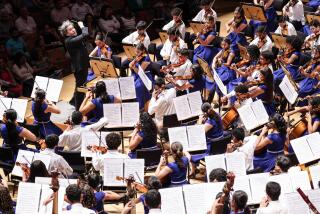MUSIC REVIEW : Shostakovich 14: Rattle Tries Again
It was the great philosopher W.C. Fields, I think, who said it best:
“If at first you don’t succeed, try again. Then quit. No use being a damn fool about it.”
I don’t think the kindly old sage could have been referring to the indomitable Simon Rattle and the brave Los Angeles Philharmonic. But if the message fits . . .
The painful saga began, innocently enough, on April 15, 1981. Enlisting Jessye Norman and Simon Estes as stellar soloists, Carlo Maria Giulini was supposed to conduct Shostakovich’s Symphony No. 14, an intensely agonizing collection of songs on the subject of death. First performed in Leningrad in 1969, the work had already received worthy performances in Los Angeles, thanks to Henri Temianka and the California Chamber Symphony (1971) and Daniel Lewis with the Los Angeles Chamber Orchestra (1979).
By the time of the belated Philharmonic premiere, Giulini had withdrawn (because of domestic problems), as had his major-league singers (reportedly for health reasons). No matter. Young Simon Rattle was ready and more than able to take over the baton, and he found appreciative vocal allies in Felicity Palmer and Stafford Dean. The result should have been a triumph.
It wasn’t. It was, in fact, something of a disgrace--not for the conductor and the Philharmonic, but for the audience.
There is nothing shocking about Shostakovich’s bleak essays, and Rattle led a poignant performance. The sophisticated opening-night subscribers, however, found the symphony either a threat to mass equilibrium or cause for a laff riot.
The text, sung in the original Russian, inspired guffaws, even when the subject--clearly defined in the program--happened to be torture and suffering. Some particularly boorish patrons fled in conspicuous protest, mid-symphony.
Rattle was shattered. He muttered a sotto-voce farewell from the podium to the deserters, and later, it is said, swore that he would keep a certain professional distance from uncivilized Los Angeles.
He did accept the principal-guest-conductor title at the Philharmonic for a while, but he never made much of it. And when he was offered the full music-directorship, he politely declined.
Yet here he was, Thursday, returning to the Dorothy Chandler Pavilion after a three-year absence to conduct, of all things, the Shostakovich 14th. He wanted to try again. And what a difference a dozen years can make.
This time Rattle received the triumph he deserved last time. The audience was large at the outset, and it stayed that way. Despite the unavoidable obbligato provided by seasonal coughers, the audience listened in rapt appreciation. The final wrenching cadence gave way to an instant bona fide ovation. There may be hope.
The conductor could not enforce structural unity where the composer ignored it; this remains more a song cycle than a symphony in any conventional sense. Nor could Rattle make the transparent chamber orchestra--19 strings plus 10 percussion instruments--achieve optimal force in a house that seats 3,200.
Nevertheless, he conveyed every facet of Shostakovich’s vocabulary--his sardonic wit, his unabashed if unsentimental lyricism, his defiant climaxes--with knowing sensitivity. Rattle obviously savors the subtle shifts of color, the sudden shafts of dissonance and the direct emotional appeal of deliriously disparate texts borrowed from Apollinaire, Lorca, Rilke and, most moving, Kuchelbecker (a Pushkin contemporary who spent two decades behind Russian bars).
Given the sudden availability of Russian singers, it might have been useful to hear the texts sung by artists who understand every word, as well as the implications behind every word, and who can articulate the texts in authentic accents. Failing that, it would make good sense to perform the work in English translation, a practice sanctioned by the composer himself.
Rattle kept the original texts but turned to Elise Ross, his American-born wife, for the soprano solos, partnered by the Jamaican basso Willard White. Although her tone might have benefited in this context from a bit more darkness and weight, she sang with the intelligence, expressivity and point we have come to expect from her. He brought to his lamentations the dignified pathos of a Porgy offset by the rolling authority of a Wotan, both roles with which he has been associated on British stages.
It might have been helpful, incidentally, if the management had provided English transliterations of the Russian poems. With this device, the New York Philharmonic had enabled its patrons last week at Lincoln Center to follow the comparable complexities of the Shostakovich 13th.
The important cello solos in the 14th, not incidentally, were played with stoic, elegiac simplicity by Daniel Rothmuller, associate principal of the Los Angeles Philharmonic. His father, the fine baritone Marko Rothmuller, had died in Bloomington, Ind., the day before.
For the second half of the program, Rattle led a bright yet tender, intimate yet urgent performance of Beethoven’s “Pastoral” Symphony.
More to Read
The biggest entertainment stories
Get our big stories about Hollywood, film, television, music, arts, culture and more right in your inbox as soon as they publish.
You may occasionally receive promotional content from the Los Angeles Times.










